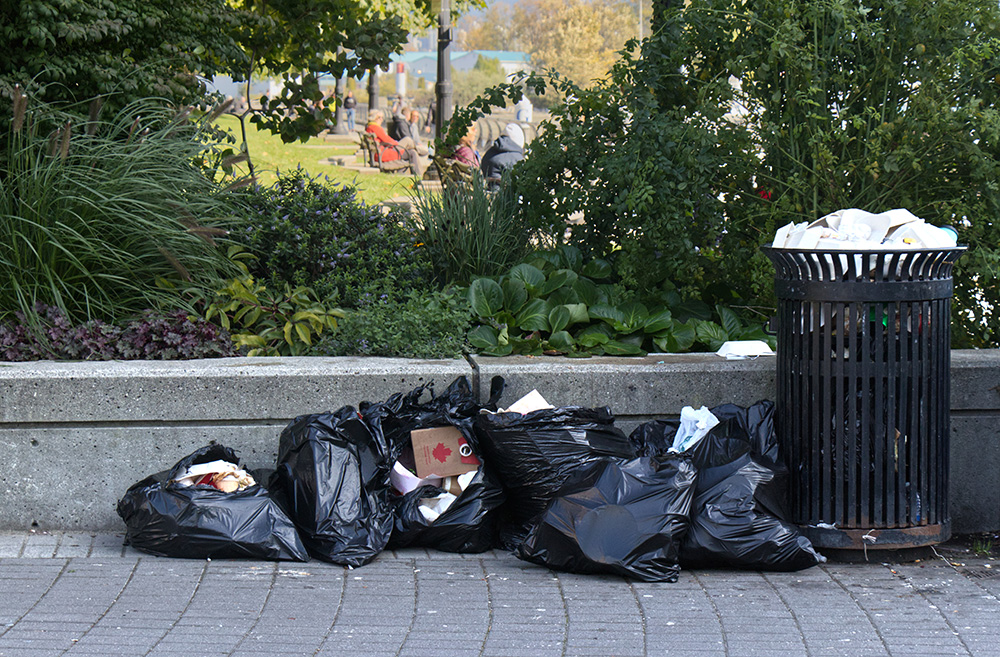A coffee cup, plastic bags, a broken umbrella and some unidentifiable smashed bit of purple plastic that could have been many things in a previous life.
On any given day walking Vancouver streets, I keep an ongoing recitation of the litter that, well, litters the street. It becomes a sad little poem after a while, a William Carlos Williams rip-off.
Some stretches are particularly bad. Anywhere near a transit stop is usually covered. You have to feel sorry for the people whose front yards border the sidewalk. It must be an ongoing battle to clean up the deluge of garbage.
It’s not just litter. For all its vaunted physical beauty, Vancouver is getting routinely trashed as people dump everything from box springs to broken TVs. Burnaby, Richmond, and even Campbell River have their issues, too.
But there are at least excuses for dumping bigger items. Fewer people have cars; junk disposal companies are expensive.
It’s the smaller stuff that I find more confounding. And irritating.
What mindset is required to open your car window and dump the remains of your McDonald’s dinner onto the street?
If you walk down almost any Vancouver block there’s an entire archeology of trash, a sedimentary layer of garbage. It’s not just a couple of random mess makers, dropping chips bags and coffee cups wherever they go.
But who should I be mad at? The trash tossers, or the corporations whose business models are built on burying us in garbage?
I get that it’s a complicated issue, connected and intersected by multiple factors, including poverty and the city’s decision to replace conventional trash cans with larger recycling stations.
I don’t want to oversimplify the problem. Although that seems to be exactly the strategy adopted by the City of Vancouver with its upbeat, almost maniacally cheerful anti-littering campaign “Be Awesome! Put Waste in Its Place!” Full of bright colours and a sing-song approach, it might work well for kids, but fully-grown humans might need something a bit stronger.
Creativity and a good dose of cheek go a long way. Incentivizing folks also works. The possibility of creating recycling programs for cigarette butts, like those offered for beer and pop cans, seems promising. Social media phenoms like #Trashtag, where people take photos of pre- and post-littered areas and post them online, have been successful.
Convenience and ease are also critical. More garbage cans and recycling bins can help.
But none of these deal with the root of the problem, which is quite simply there’s too much stuff to throw away.
Instead of challenging the corporations who sell over-wrapped, plastic-packaged, disposable junk, anti-litter campaigns blame individuals.
Those of us of a certain age may remember the Keep America Beautiful anti-littering campaigns from the early 1970s. One ad featured a man dressed as a Native American, a single tear falling down his face after watching people throwing shit everywhere.
Despite the fact that the campaign was total blarney (the ad was sponsored by Coca-Cola, Philip Morris and Anheuser-Busch, and the actor was actually Italian-American), the damn thing worked. Litter decreased by 88 per cent in almost 40 U.S. states.
But the emphasis on individual responsibility had other, long-standing repercussions, an article in the Chicago Tribune noted: “By making individual viewers feel guilty and responsible for the polluted environment, the ad deflected the question of responsibility away from corporations and placed it entirely in the realm of individual action, concealing the role of industry in polluting the landscape.”
“The answer to pollution, as Keep America Beautiful would have it, had nothing to do with power, politics or production decisions; it was simply a matter of how individuals acted in their daily lives,” the Tribune article noted.
This emphasis on individual behaviour rather than systemic change endures to this day. Anti-littering campaigns, like Vancouver’s Be Awesome! ads stem from the runaway success of this strategy.
A Guardian article noted the campaigns focus on consumers, who have the least amount of power to affect systemic change. The onus should really fall on the corporations who produce and market single-use items, not the punters who aren’t sure what to do with their coffee cups.
It’s far easier to rage at your fellow citizens than to demand that companies like Tim Hortons or Starbucks find better solutions.
A trashed city isn’t only about humans being arseholes — which sometimes they are. The bigger culprits, the ones hiding behind slick marketing campaigns, are those who maintain that only personal choices and responsibility can turn back the rising tide of junk.
As George Monbiot keeps on reminding us, “From this misdirection arise a thousand perversities.”
Don’t waste your anger. ![]()
Read more: Municipal Politics
















Tyee Commenting Guidelines
Comments that violate guidelines risk being deleted, and violations may result in a temporary or permanent user ban. Maintain the spirit of good conversation to stay in the discussion.
*Please note The Tyee is not a forum for spreading misinformation about COVID-19, denying its existence or minimizing its risk to public health.
Do:
Do not: